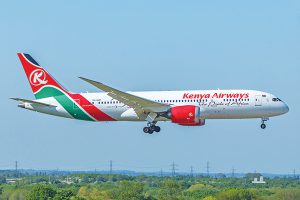Bloomberg
Kenya Airways Plc’s board gave approval for the carrier to hedge prices for more than 35% of its fuel needs and is in talks with the African Airlines Association for bulk fuel purchases in a drive to cut costs.
Fuel accounts for at least a quarter of costs for the airline in which the Kenyan government has a 48.9% stake, Chief Executive Officer Allan Kilavuka said in an interview.
“During the pandemic, even shortly thereafter, there was no need to hedge because hedging is expensive as well,†he said. “We will look for counter parties when the fuel price stabilises and determine how much of our fuel we want to hedge so that we mitigate against the volatility.â€
The airline known as KQ last had a fuel hedge during February-July 2020. Direct operating costs advanced 33% last year, driven partly by the global rise in fuel prices, according to the company. Jet fuel climbed more than 1.4 times from a year ago to $161.60 per barrel last week, according to the International Air Transport Association’s Jet Fuel Price Monitor.
It expects another 20 billion shillings ($173.8 million) allocation from a supplementary budget approved by lawmakers. The cash will be a loan, although the government could decide to convert it into equity in future, Kilavuka said, without providing the terms of the financing.
“A portion of it is to support restructuring of the airline, in terms of renegotiating some of the terms of engagement with our suppliers, part of it is general working-capital support for the business and operational support. Part of it is to help stabilise our balance sheet,†Kilavuka said.
A six-month Seabury Securities consultancy deal to help KQ cut costs, improve efficiency and return to growth ends in September.
The carrier managed to narrow its full-year loss to 15.9 billion shillings in 2021 from 36.2 billion shillings a year earlier after sales jumped by 33%. It is flying at 69% of its pre-pandemic capacity and expects it climbs to as much as 95% during peak seasons.
KQ returned two leased Boeing 737-700 aircraft last year, reducing its fleet to 34 craft. It plans to remove two Embraer 190 this year, and to shrink its network by 10% in the long term, he said.
Following the government’s turnabout on fully nationalising the airline, plans have now pivoted towards a partnership with South African Airways and later bringing on board other African carriers to widen KQ’s footprint without investing heavily in assets, he said.
 The Gulf Time Newspaper One of the finest business newspapers in the UAE brought to you by our professional writers and editors.
The Gulf Time Newspaper One of the finest business newspapers in the UAE brought to you by our professional writers and editors.
